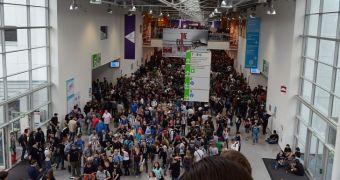Gamescom 2014 ended over a week ago and after quite a bit of thought, it's time for the games industry and organize Koelnmesse in particular to admit something: Gamescom is too big for its own good.
I've been to the large German convention for three times in total, this year, in 2013, and in 2011. Every time the convention looked like a massive experience but every time it kept getting bigger and bigger, both in terms of scale and in terms of how many people attended.
In theory, the convention is a really good idea. It allows for game companies to get in direct contact with the actual consumers, as regular people can attend the event, while still making business in their own special zone, not to mention at the traditional GDC Europe gathering that takes place in the two days before the actual Gamescom expo.
However, after the first day, which is reserved for the media and trade visitors, the whole convention becomes a giant monster weighed down by the thousands if not tens of thousands of people who enter its doors.
This year saw a whopping 335,000 attendants. Spread over the four days of public availability, it means that 83,750 people visited the Koelnmesse center each day. That larger that most football fields. Condense these people across four halls and a few other spaces and it's a recipe for a slow-moving disaster.
Getting from the press center in the northern part of the building to the business area in halls 4 and 5 required at least 30 minutes at peak hour, as there were literally wall-to-wall people barely moving due to the huge crowds both in front and in the back.
While the Koelnmesse trade fair grounds is quite massive, not even it can withstand the huge crowds drawn in by Gamescom.
Throw in the fact that, during the supposed media day, a huge number of "trade visitors" are given badges to flock towards the public zones, and you'll find plenty of people waiting in line at practically all major booths.
While the aforementioned reasoning may sound like just the complaint of a journalist or someone who had to conduct business during Gamescom, for the regular consumer it's even worse. The huge crowds means that any of the public booths have huge lines in front of them, no matter their importance. Lines for popular games like Battlefield Hardline or Call of Duty: Advanced Warfare easily meant that fans had to wait for 3-4 hours before getting a chance to actually play the games, if they were lucky, or just see a short presentation.
This year also saw some rather absurd measures taken by the Koelnmesse team, such as the ban on taxis that would gather in the northern side of the complex and would provide easy access to the rest of Cologne. This meant that anyone who didn't want to walk all the way to the train station had to hail taxis that were few and far in between.
Actual video game developers are suffering from the huge popularity of the event, as renting booths, even in the business section, has gotten hugely expensive. Already plenty of studios, small or large, have begun renting out suites in the nearby five-star hotels for less money than they would need to have spent on Gamescom. This was confirmed to me by Press Play, the studio behind Project Totem.
For next year the job of the organizers is simple: sell less tickets and sacrifice a bigger profit over happier customers. Allow taxis in the small northern zone and don't be afraid to shut down the doors in case things get too crowded.

 14 DAY TRIAL //
14 DAY TRIAL //